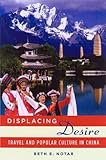Displacing Desire : Travel and Popular Culture in China / Beth E. Notar.
Material type: TextPublisher: Honolulu : University of Hawaii Press, [2006]Copyright date: ©2006Description: 1 online resource (293 p.) : 17 illus., 2 mapsContent type:
TextPublisher: Honolulu : University of Hawaii Press, [2006]Copyright date: ©2006Description: 1 online resource (293 p.) : 17 illus., 2 mapsContent type: - 9780824829803
- 9780824862190
- 306.4/819095135222
- online - DeGruyter
- Issued also in print.
| Item type | Current library | Call number | URL | Status | Notes | Barcode | |
|---|---|---|---|---|---|---|---|
 eBook
eBook
|
Biblioteca "Angelicum" Pont. Univ. S.Tommaso d'Aquino Nuvola online | online - DeGruyter (Browse shelf(Opens below)) | Online access | Not for loan (Accesso limitato) | Accesso per gli utenti autorizzati / Access for authorized users | (dgr)9780824862190 |
Frontmatter -- Contents -- Acknowledgments -- Abbreviations -- A Note On Transcription -- Measure Conversions From Chinese To American And Metric -- Chapter 1. With The Sign Begins The Search -- Chapter 2. Lonely Planeteers And A Transnational Authentic -- Chapter 3. Five Golden Flowers Utopian Nostalgia And Local Longing -- Chapter 4. Heavenly Dragons Commodifying A Fantastic Past -- Chapter 5. Earthly Demons Displacing The Present -- Chapter 6. Off And On The Road To Reform -- Notes -- Bibliography -- Index -- About The Author
restricted access online access with authorization star
http://purl.org/coar/access_right/c_16ec
Why do millions of people from around the world flock to Dali, a small borderland town in the Himalayan foothills of southwest China? "Lonely planeteers"- American, European, and Israeli backpackers named for the guidebook they carry-trek halfway across the globe to "get off the beaten track," yet converge here to drink coffee, eat banana pancakes, and share music from home. Coastal Chinese who are prospering in the phenomenal economic growth of China's reform era travel thousands of miles to sing songs and dress up as their favorite characters from a revolutionary-era movie musical. Overseas Chinese from Southeast Asia as well as a new generation of mainland youth follow in the footsteps of heroes and villains from Hong Kong martial arts novels, seeking an experience of a Buddhist "wild, wild, West" at a martial arts theme park dubbed "Hollywood East," or "Daliwood."Inspired by representations in popular culture that engender fantasies of the exotic, these tourists, Western and Chinese, journey to Dali, Yunnan, in search of an imagined place where they can indulge their craving for authenticity, display their status in the present, and act out their nostalgia for the past. Based on more than a decade of ethnographic research, Beth Notar explores struggles over place as people in Dali attempt to represent their historical identity and define their future.Displacing Desire takes representation into the realm of practice to consider the ways in which those who are represented must contend with their image in popular culture and the material after-effects of representations even decades after their original production. It contributes to an exploration of travel as performance of nostalgia, fantasy, and status. More specifically it contributes to an understanding of the growth of consumer culture in China, examining what China's modernization process and market economy mean for different social actors in their struggles over power and place.
Issued also in print.
Mode of access: Internet via World Wide Web.
In English.
Description based on online resource; title from PDF title page (publisher's Web site, viewed 02. Mrz 2022)


